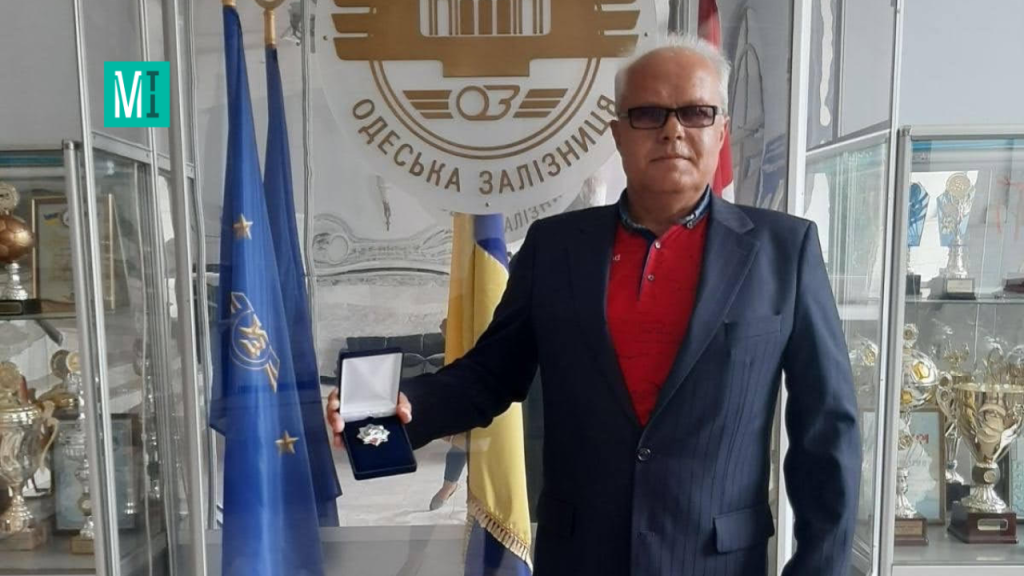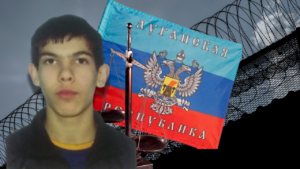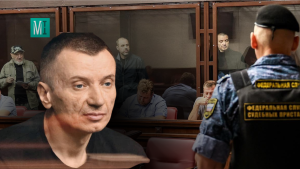Russians Sentenced Kherson Railway Worker Oleksandr Kerekesha to 6.5 Years in Prison

The head of the Kherson Track Division No. 15 of the Odesa Railway was accused of sabotage. He will spend the first year in prison and the remaining 5.5 years in a strict regime colony.
His relatives recall that at the beginning of the full-scale invasion, Oleksandr Kerekesha practically lived at work. As the head, he was in charge of a railroad track in the Kherson region. When the Russians occupied the regional center, he allowed his subordinates to go home.
— He had an apartment in the city’s suburbs, so my husband, son, and I moved there. It was safer, — Viktoriia, Kerekesha’s daughter-in-law, recalls. — Four of us lived together until people started leaving the city. Then we decided that we would also leave. We asked Oleksandr to come with us, but he flatly refused. He also opposed our leaving, hoping that everything would end soon. Eventually, we went to Odesa, and he stayed in his apartment.

Oleksandr Kerekesha with his family. Photo: Family archive.
Oleksandr Kerekesha was abducted on September 13, 2022. It happened in the presence of his neighbors. His relatives recall that several Railroad’s Track Division employees had started collaborating with Russian authorities in July.
— First, they abducted the head of the HR department, then took the driver, and on September 13, they came for my father-in-law. He was at home. The occupiers broke the locks — the daughter-in-law recounts the words of witnesses.
As she recounts, the Russians forced her father-in-law out onto the street and, using physical force, put him in a car and drove away in an unknown direction. An hour later, the occupiers returned. They were interested in the personal vehicle and belongings of the apartment owner.
— They took everything from the house, even the fishing rods — Viktoriia recalls.
Kherson Temporary Detention Facility
Relatives who stayed in Kherson began searching for Kerekesha. They found him in the Temporary Detention Facility on Teploenerhetykiv Street, 3. The duty officer stated that he could not comment on the reasons for the detention and advised them to contact the occupation military commandant’s office, where they were told that they had received many denunciations against Oleksandr Kerekesha.
— They were most likely written by employees who had switched to work for the Russians. The statements indicated that the head forced the workers to work for the Ukrainian authorities under threat of a gun.” — Viktoriia recalls.

A cell in the Kherson Detention Center, where people may have been tortured. November 14, 2022. Photo: ‘Suspilne.’
Oleksandr Kerekesha stayed in the temporary detention center until October 20. During this time, his relatives brought him parcels twice a week. Later, as the occupiers retreated from the right bank of the Kherson region to the left bank, they took Kerekesha with them. His relatives searched for him in Hola Prystan, Nova Kakhovka, and Chaplynka. Eventually, they found him in Kalanchak.
Kalanchak — Chonhar
In April 2023, the family received a letter from Oleksandr. It was delivered by guys who had been in the same cell as him and were released by the Russians.
— He wrote that he missed us very much and, though struggling, he was staying strong. He wrote, “I will endure everything because, after what I have experienced, I have no right not to survive. The main thing is freedom.” Since then, we have occasionally received some news about our father — Viktoriia shares the details.
Oleksandr Kerekesha was held in the Kalanchak detention center until August 2023. But one day, when his relatives brought him a package, the duty officer informed Oleksandr was taken away. However, he didn’t tell the family where he had been moved. Two days later, it was discovered that he was being held in Chonhar.
On August 17, 2023, Russian media released a video in which the occupiers claimed that Oleksandr Kerekesh had just been detained on the left bank of the Kherson region in an abandoned building. His relatives are convinced that this video is staged.
— The occupiers showed Oleksandr’s detention after he had been held in captivity for a year. But this is a fake story, — Viktoriia, his daughter-in-law, notes. — Russian news reported that they had detained a railway worker who obstructed weapons supplies. He was accused of espionage, which could have led to a 20-year prison sentence for my father-in-law.
The episode of Oleksandr Kerekesha’s detention
In the fall of 2023, Kerekesha sent a letter through an acquaintance. He mentioned that he was struggling and that the FSB had started working with him. Before this, while he had been held in Kalanchak for almost a year, the FSB had not been involved. The possible reason could be a lack of evidence, which might be why the Russians could not initiate a case against Kerekesha during that time. At least, those who shared a cell with Oleksandr claim that.
The Verdict
The last letter from Oleksandr arrived at the end of May this year. It was addressed to a colleague, a former railway employee, one of those who testified against Oleksandr Kerekesha during the occupation.
— Probably, this employee or his family were threatened, and he was forced to tell the Russians everything that happened in the early days of the full-scale invasion, — Viktoriia suggests.
In the letter, 63-year-old Oleksandr Kerekesha mentions that he holds no grudges against his colleague and asks him to send medication and personal items. From Russian media, his relatives learned that Kerekesha had been sentenced to 6.5 years in prison, which is a very lengthy term given his age.
Oleksandr’s relatives sought help from a lawyer in the occupied territory. However, the lawyer billed 50,000 rubles and provided no guarantees of being able to meet with the defendant. That made the family reject her services.
— We contacted the Red Cross with a request in early June but haven’t received a response yet. My father-in-law’s health has significantly deteriorated, and we need to do everything possible to secure his immediate release, — daughter-in-law Viktoriia highlights.
As a reminder, at least 922 residents of the Kherson region were held in Russian captivity at the beginning of 2024, as provided by Oleksandr Prokudin, head of the Kherson Regional Military Administration.
This article has been prepared with the support of the Ministry of Foreign Affairs of the Netherlands.
Oksana Hunko, journalist MIHR







